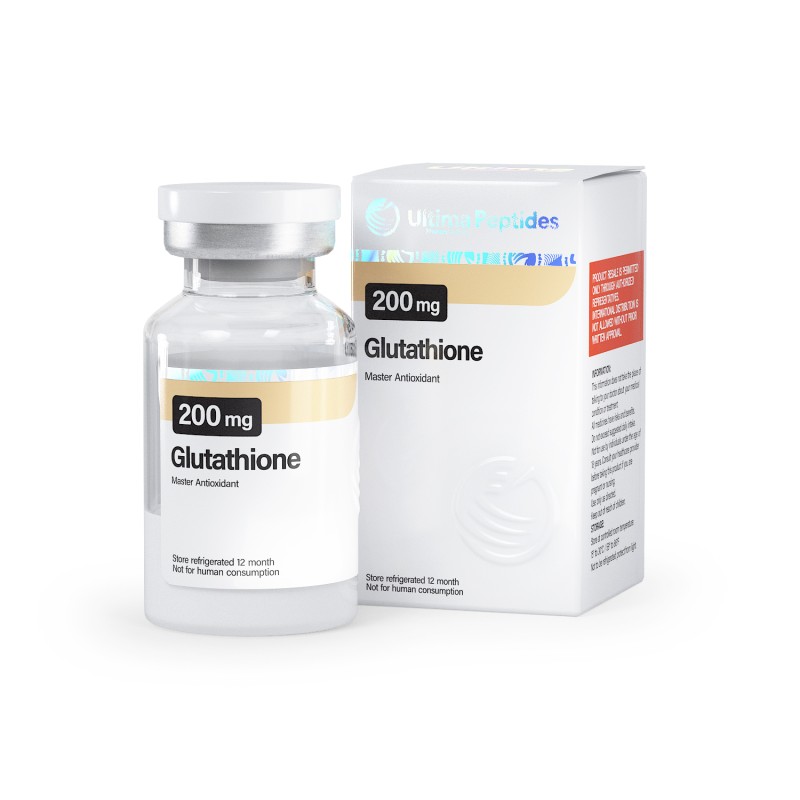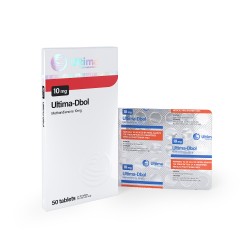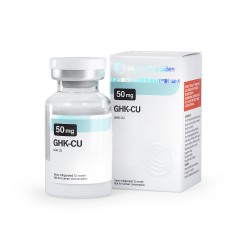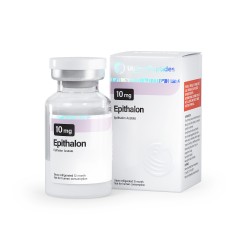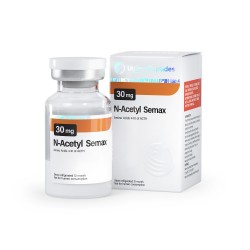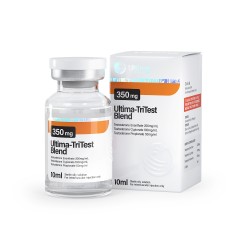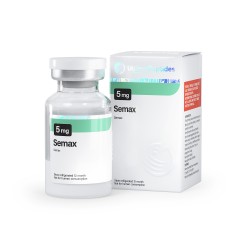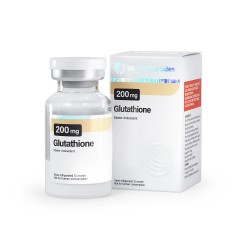
Ultima-Glutathione - Ultima Pharmaceuticals - US
MANUFACTURER Ultima Pharmaceuticals - US
WAREHOUSE USA Warehouse 5
SUBSTANCE
Glutathione,

Ultima-Glutathione
DO NOT FREEZE! DO NOT STORE AT ROOM TEMPERATURE!
Products are shipping without box for security reasons.
What is Glutathione?
Glutathione is a small molecule made from three amino acids: cysteine, glutamate, and glycine. It helps the liver detoxify harmful substances. Glutathione is also an antioxidant, meaning it mops up dangerous chemicals called free radicals (oxygen-containing molecules that can damage cell structures, including DNA).
Glutathione exists in two forms: reduced (GSH) and oxidized (GSSG). The ratio between GSH and GSSG determines the antioxidant ability of a cell. Resting healthy cells have a GSH:GSSG ratio over one hundred; this ratio drop to between one and ten in cells exposed to stressors.
What are Glutathione's Health Benefits?
- Glutathione supports the immune system and may have antibacterial properties.
- The liver is crucial for detoxification (converting toxic substances to non-toxic compounds that the body can safely eliminate). Glutathione has an essential role in the liver in these detoxification reactions.
- Glutathione supports healthy lungs by reducing inflammation and helping to regulate a substance called surfactant that keeps the air sacs (alveoli) healthy.
- Glutathione treatment improves lung function in patients with cystic fibrosis.
- Glutathione may improve athletic performance by reducing muscle fatigue.
- Glutathione helps lighten sun-damaged skin. It also reduces the appearance of wrinkles and other signs of aging.
How to Test for Glutathione Deficiency
Glutathione levels can vary depending on diet, health status, and other factors. It's essential to work with a functional or integrative medicine provider to interpret the results of these tests and determine if a glutathione deficiency is present and what the underlying causes might be.
- You can measure glutathione levels directly from a blood sample.
- The organic acids test (OAT) by Great Plains Laboratory measures many different metabolites in the urine. One of these metabolites, called pyroglutamic acid, can be elevated during periods of poor nutrition, stress, toxin exposures, and oxidative stress, among others. Elevated pyroglutamic acid in the urine implies that the body's glutathione stores are depleted.
- The Advanced Oxidative Stress Profile is a comprehensive urine and blood test that evaluates reduced, oxidized, and total glutathione plus two other oxidative stress markers.
- The data for decreased zinc levels caused by long-term glutathione supplementation are limited; however, total serum zinc can be measured if you have concerns.
- The total serum zinc measurement can be inaccurate if your albumin levels are low or inflammatory markers are elevated.
- Ferritin, ESR, and CRP are commonly used markers of inflammation.
- If you have a high index of suspicion for a chronic zinc deficiency, then an RBC zinc may be more accurate.
How Much Glutathione Supplementation Is Safe?
Studies in humans have evaluated the use of intravenous glutathione. Researchers used a single dose of 1200 mg intravenous glutathione in one study. Another study demonstrated that 1400 mg glutathione administered intravenously three times a week for four weeks was well tolerated with no adverse events. Intravenous glutathione has to be administered by a healthcare professional.
How to Supplement Glutathione?
You can administer glutathione intravenously. IV therapy allows higher levels of glutathione to be delivered directly into the bloodstream, which may be beneficial for some medical conditions.
Are There Any Risks to Supplementing Glutathione?
Most studies on the effectiveness of glutathione supplementation are short-term, so the long-term risks and benefits of glutathione supplementation still need to be better understood.
Some possible side effects of glutathione supplementation include:
- Asthma: nebulized (inhaled) glutathione has triggered airway narrowing, cough, and breathlessness in people with asthma.
- Zinc deficiency: some sources report an association between long-term glutathione supplementation and low zinc levels; however, human studies have not been performed to validate this.
- Glutathione supplementation has not been studied for safety during pregnancy or breastfeeding.
Summary
- Glutathione is an antioxidant that is naturally produced in the body. It plays a crucial role in protecting cells from damage caused by free radicals and toxins and is also involved in maintaining the health of the immune system. Low levels of glutathione have been linked to several health conditions.
The effectiveness of glutathione supplementation will vary depending on the specific health condition being treated. Working with an integrative or functional medicine practitioner is the best way to ensure your supplementation strategy is evidence-based, safe, and appropriate.

